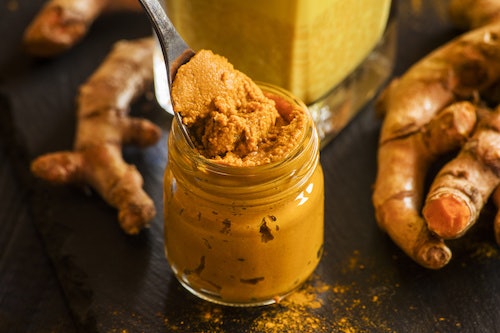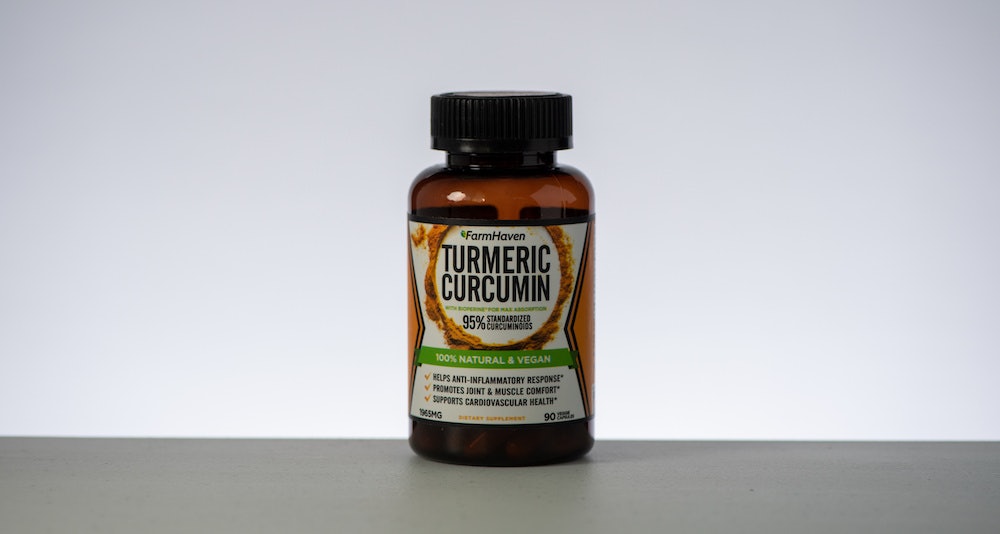- How Turmeric Helps with Inflammation
- Turmeric for Inflammation: Help for Certain Conditions
- How Much Turmeric Do You Need?
- How to Take Turmeric for Inflammation
- Dangers of Turmeric for Inflammation
- Frequently Asked Questions
Turmeric, also known as Indian saffron, is most commonly used in South Asian and Middle Eastern dishes (including many types of curries). Over the years, it has become a staple health supplement for many worldwide, not just a spice. Many people now take turmeric for inflammation, whether to help ease cancer symptoms, reduce inflammation in the digestive system, or heal wounds. But how effective is turmeric as an alternative therapy for inflammation versus conventional medicine?
How Turmeric Helps with Inflammation
Turmeric is effective against inflammation because of its main medicinal property, curcumin (also why turmeric is so yellow). It's been used as a medical herb for many years in Asian countries due to its anti-inflammatory, anti-cancer, antimicrobial, and antioxidant properties. But how does turmeric help with inflammation specifically?
Scientific studies have shown that curcumin helps regulate molecules, enzymes, and other factors that cause inflammation in your body.
In science-speak, it down-regulates the enzymes, growth factor recepts, and molecules that encourage inflammation and inhibits the production of inflammatory cytokines and other proteins known to promote the growth of tumors.
Turmeric for Inflammation: Help for Certain Conditions
Turmeric can help with chronic inflammation that may be an underlying factor in major diseases and health issues, such as:
- Alzheimer's disease
- Epilepsy
- Multiple sclerosis
- Parkinson's disease
- Brain injury
- Cancer
- Asthma
- Bronchitis
- Colitis
- Obesity
- Depression
- Fatigue
- Renal ischemia
- Psoriasis
- Rheumatoid arthritis
- Cardiovascular diseases
- Type II diabetes
- Allergies
Turmeric for Cancer
Some studies found that although turmeric should not be considered a cure for cancer, it has been shown to fight cancer cells and slow the progression of some cancers. However, turmeric should not be considered an alternative to chemotherapy.
Turmeric is Safe For Your Pets Too!
Turmeric is also used by many as an at-home remedy for pet tumors. Although it's not a cure for cancer, by any means, many have found feeding your pet turmeric paste can help reduce the inflammation caused by tumors. However, don't use human-grade turmeric for your pets, as there may be additives that are safe for humans but harmful to animals.
How Much Turmeric Do You Need?
It's typically suggested that 500-2,000mg of turmeric help with inflammation. However, this differs depending on medical needs and individual circumstances. Always consult your doctor before adding supplements to your diet, including turmeric.
Just adding turmeric to your food isn't enough to get the full benefits of the spice. The spice itself only contains about 3% of curcumin, while extracts and supplements contain about 95% of curcumin—the component that you really need.
However, if you just want to have some turmeric in your diet as a healthy additive, you can add it to your foods, including your:
- Rice
- Smoothies
- Soups
- Eggs
- Muffins
- Roasted vegetables
Always Read the Labels
When buying turmeric either in capsules or as a powder, always check the ingredients and instructions first. Some products include other additives that may be harmful to your situation, while others have a higher concentration of turmeric.
Turmeric for Inflammation From Arthritis
According to the Arthritis Foundation, 400 to 600mg of turmeric capsules taken three times daily can help with inflammation from arthritis. 3 grams of turmeric root powder can be taken as an alternative.
How to Take Turmeric for Inflammation
There are several different ways to get your daily dose of turmeric, including via:
- A paste (homemade or bought)
- A liquid extract
- Powder form or capsules
Turmeric Paste
Since the human body does not easily absorb turmeric on its own, it's often suggested to make it into a paste (also known as golden paste) before ingesting it. Simply mix it with some ground black pepper and olive oil to create a paste that you can add to your food.
While you can make your own turmeric paste, you can also buy paste already made. Just be sure to read the ingredients to know exactly what's in it and how much to take.

Turmeric Paste Recipe
Make your own turmeric paste and add it to your food for a healthy (and tasty) boost! Using this recipe, you can store your turmeric paste (or golden paste) in the fridge for up to two weeks.
Ingredients:
- 1/2 cup of ground turmeric
- 1 cup of water
- 1/4 cup of coconut oil (or olive oil)
- 1 ½ tablespoon of ground black pepper
Directions:
- Combine water and turmeric powder in a small pot over low heat.
- Mix until it forms a paste.
- Stir in the oil and ground black pepper.
- Once the mixture is thick, turn off the heat.
- Let it cool, then store in an airtight container in the refrigerator for up to two weeks.
This is just one recipe for turmeric paste—there are several other versions online.
Turmeric Liquid Extracts
Turmeric also comes in concentrated liquid extracts. Liquid extracts tend to be more effective than other forms of turmeric as your body absorbs more of it. According to Shot X, 98% of liquid extract is absorbed by the body, versus only up to 53% when taken in powder form. Since turmeric extract is much more potent, it can take up to 20 turmeric capsules to equal a single teaspoon of liquid extract.

Another reason why many people prefer turmeric liquid extract is because it's made from the turmeric plant, while powder is only made of curcumin. While curcumin provides anti-inflammatory properties, utilizing the whole turmeric plant offers more significant health benefits.
If you have issues with digestion, liquid turmeric might be your best option as your body doesn't need to break down liquid extracts as it does with turmeric capsules.
Turmeric Extract Powder
If you make smoothies regularly, then it's easy just to add turmeric powder to it. Depending on how much you put in and what else is in your smoothie, it may not make a difference to the flavor at all, but in some cases, it may make it more bitter and peppery.
Turmeric Capsules
Turmeric capsules are a great option if you want something quick and easy to take each day and don't mind swallowing pills. The great thing about capsules is that you don't need to mask the flavor with food, so there's no meal prep involved.
Always check how many milligrams of turmeric/curcumin is in each capsule before taking it, as too much can lead to health issues.
Tumeric for Inflammation: Dosage
According to the World Health Organization, the most you should take daily is 1.4mg per pound of your body weight. Some studies have shown that up to 8 grams of turmeric per day is safe. However, most recommendations are nowhere close to 8 grams per day, so you shouldn't ever need to take this much.
Stick to the daily 500-2,000mg suggestion, and remember to consult with your doctor first to ensure it's safe for you to take.
Dangers of Turmeric for Inflammation
There's plenty of evidence that turmeric has several health benefits, including anti-inflammatory benefits, but as with most things, there is such a thing as too much turmeric.
If you take too much turmeric, you may experience:
- Diarrhea
- Constipation
- Dizziness
- Nausea
- Stomach pain
Only take as much turmeric as recommended and consult your doctor before starting any kind of supplement regime.
Who Shouldn't Have Turmeric?
Always consult your doctor before taking turmeric supplements. You must avoid taking turmeric if you:
- Have an iron deficiency (turmeric can make it harder for your body to absorb iron)
- Have or are prone to kidney stones (turmeric contains oxalates which can increase your chances of getting kidney stones)
- Have gallbladder disease (turmeric helps to increase bile secretion, which can cause issues with gallstones and bile duct obstructions)
- Have a bleeding disorder or will be getting surgery (turmeric thins the blood, so you shouldn't take it if you have blood clotting issues or will be going under the knife)
- Are pregnant or breastfeeding (while there are no studies that turmeric is harmful to mothers who are pregnant or breastfeeding, or to the child, taking turmeric in larger amounts may cause changes in estrogen levels, causing contractions, bleeding, early labor, and even leading to pregnancy loss)
- Are taking other drugs, including aspirin, blood pressure medication, or blood thinners (e.g., Warfarin) (turmeric may have adverse drug interactions)



Comments